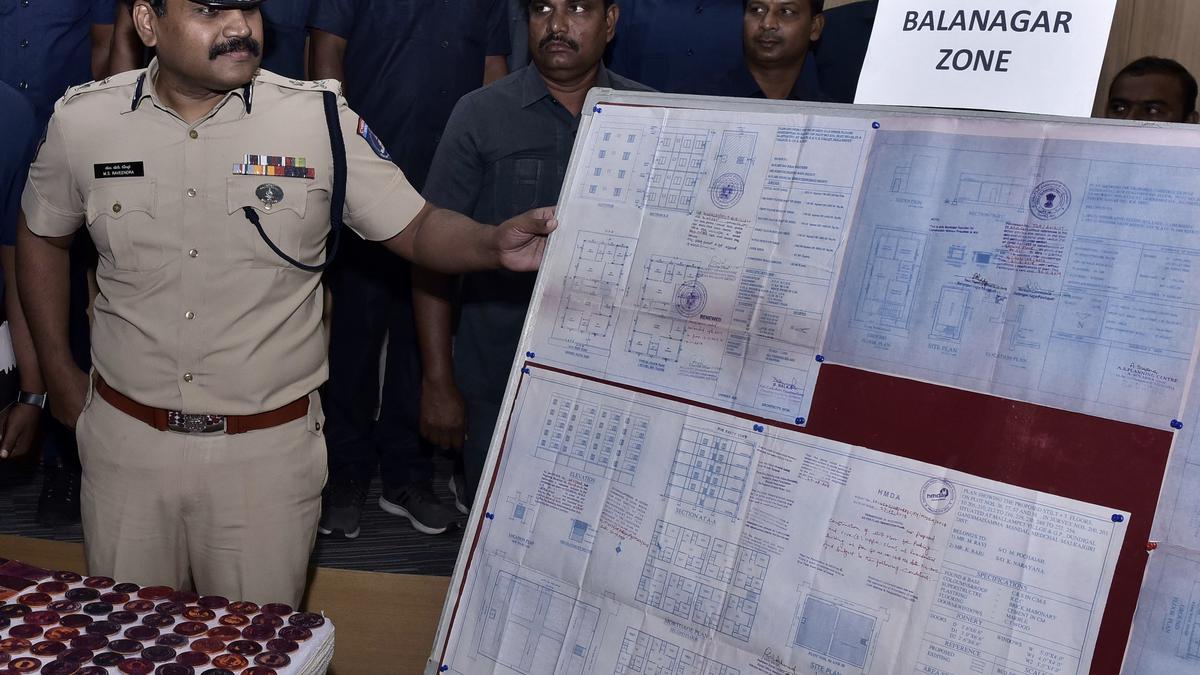
Cyberabad police busts gangs operating ‘organised loan frauds’
The Hindu
Cyberabad Police busts two organised gangs for converting rejected loan applications into eligible ones using fake documents. 18 persons arrested, 687 fake rubber stamps, 1,180 fake certificates and documents seized. Agents, bankers, advocate panels and valuators involved in larger racket yet to be verified.
Converting loan applications rejected by banks on grounds of deviations and irregularities into eligible ones, by supplementing them with fake documentation has been the modus operandi of two organised gangs here.
By using fake rubber stamps, certificates and documents of the Greater Hyderabad Municipal Corporation (GHMC), Hyderabad Metropolitan Development Authority (HMDA) and the Revenue Department were created by the gang members — a set of loan agents, consultants, rubber stamp makers, and fabricator of building plan and layouts — they carried out transactions worth over ₹10 crore.
Cyberabad Police Commissioner M. Stephen Raveendra disclosing the organised racket and explaining the business craft to media persons on Tuesday, said the Balanagar special operation team along with Kukatpally and KPHB police, in the two separate cases arrested 18 persons.
Key organiser G. Ranga Rao, an accused in 2005 and 2012 in similar cases, rectifies such deviations to make the applications fit. He gets rubber stamps as per the requirement from one Manik Prabhu. While one Sudhakar is a loan consultant, Naga Malleswar Rao and Seeta Rama Raju loan agents, Chandra Sekhar fabricates building plans and layouts. Each of them has a fixed rate, a fake rubber stamp costs ₹1000, a fake layout ₹2000 and each document up to ₹10,000.
The loan application thus submitted to the bank afresh is followed up by agents and consultants with bankers, panel advocates and evaluators for final approval. Each successful loan earns a commission of about 4%.
Mr. Raveendra said the role of other agents, bankers, advocate panels and valuators, in the larger organised racket, is yet to be verified.
A similar case was recorded in Kukatpally, where customers approached agents for business loans.

“Writing, in general, is a very solitary process,” says Yauvanika Chopra, Associate Director at The New India Foundation (NIF), which, earlier this year, announced the 12th edition of its NIF Book Fellowships for research and scholarship about Indian history after Independence. While authors, in general, are built for it, it can still get very lonely, says Chopra, pointing out that the fellowship’s community support is as valuable as the monetary benefits it offers. “There is a solid community of NIF fellows, trustees, language experts, jury members, all of whom are incredibly competent,” she says. “They really help make authors feel supported from manuscript to publication, so you never feel like you’re struggling through isolation.”

Several principals of government and private schools in Delhi on Tuesday said the Directorate of Education (DoE) circular from a day earlier, directing schools to conduct classes in ‘hybrid’ mode, had caused confusion regarding day-to-day operations as they did not know how many students would return to school from Wednesday and how would teachers instruct in two modes — online and in person — at once. The DoE circular on Monday had also stated that the option to “exercise online mode of education, wherever available, shall vest with the students and their guardians”. Several schoolteachers also expressed confusion regarding the DoE order. A government schoolteacher said he was unsure of how to cope with the resumption of physical classes, given that the order directing government offices to ensure that 50% of the employees work from home is still in place. On Monday, the Commission for Air Quality Management in the National Capital Region and Adjoining Areas (CAQM) had, on the orders of the Supreme Court, directed schools in Delhi-NCR to shift classes to the hybrid mode, following which the DoE had issued the circular. The court had urged the Centre’s pollution watchdog to consider restarting physical classes due to many students missing out on the mid-day meals and lacking the necessary means to attend classes online. The CAQM had, on November 20, asked schools in Delhi-NCR to shift to the online mode of teaching.









